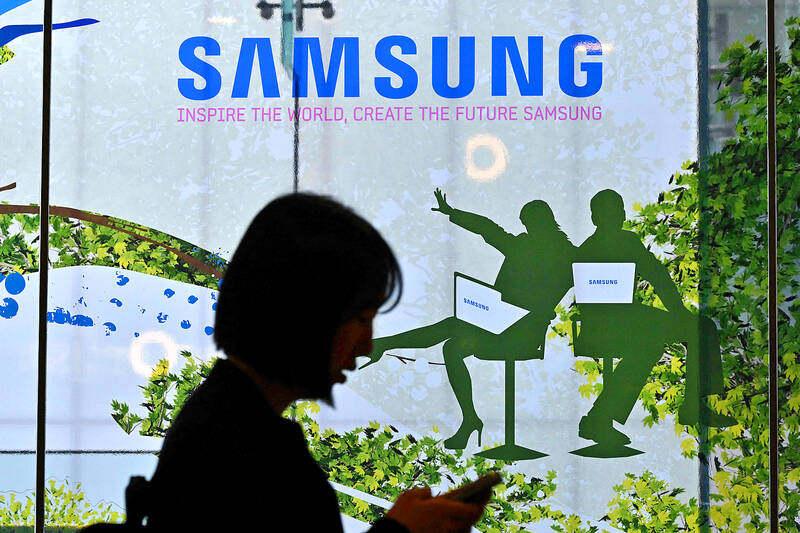The new head of Samsung Electronics Co’s semiconductor division urged employees to work their way past challenges in the business, making his first remarks to staff after the surprise departure of his predecessor last week.
Jun Young-hyun — a memory chip veteran who is returning to the company after leading Samsung SDI Co — unexpectedly replaced Kyung Kye-hyun as the new leader of its most important business line on Tuesday last week.
“I am confident that we can overcome the recent difficulties as quickly as possible if we continue to build on the strengths we have accumulated so far and continue the culture of communication and discussion that is unique to semiconductors,” Jun said on an internal site seen by Bloomberg News.

Photo: Jung Yeon-je, AFP
Jun would be facing a series of challenges. Its semiconductor division lost about 15 trillion won (US$10.9 billion) last year. The company has fallen behind rival SK Hynix Inc in high-bandwidth memory chips, which have seen explosive growth, as they are used for training artificial intelligence (AI) models like ChatGPT. The firm is also facing the first-ever strike in its 55-year history.
“Especially now, in the age of AI, we are facing a future that we have never experienced before,” he said. “This poses a great challenge to us, but if we respond with the right direction, it can be a new opportunity for the semiconductor business, which is essential in the AI era.”
Investors have become increasingly concerned about Samsung’s response to SK Hynix, which reported its fastest pace of revenue growth since 2010. That has propelled about 40 percent rally in SK Hynix shares since the start of this year, compared with a slump of about 5 percent for Samsung’s.
In other news, India would have to attract a wider range of semiconductor suppliers to succeed in building a robust domestic chip industry, trade group SEMI president and CEO Ajit Manocha said.
“They need to really increase the emphasis on the ecosystem because, without an ecosystem, growth will be limited,” Manocha said on the sidelines of the India-Taiwan Semiconductor Forum in Taipei on Thursday. “They need to encourage smaller and medium-sized companies to come and set up shop in India.”
Indian Prime Minister Narendra Modi has set up a US$10 billion fund to help attract global chipmakers such as Taiwan Semiconductor Manufacturing Co (台積電).
Manocha said that if Modi wins a third term, the country is very likely to expand the program beyond US$10 billion to help create a comprehensive ecosystem.
However, no major semiconductor firms have committed to significant investments in India so far, partly due to challenges with infrastructure, including a stable power supply.
The two most high-profile projects are a US$11 billion site by the Tata Group in partnership with Powerchip Semiconductor Manufacturing Corp (力積電) to make mature chips, and a US$2.75 billion assembly and testing facility by Micron Technology Inc.
India is on the right track, Manocha said, adding that the Tata and Micron projects can act as catalysts for the country’s plans to build a technology foundation in the country.

MULTIFACETED: A task force has analyzed possible scenarios and created responses to assist domestic industries in dealing with US tariffs, the economics minister said The Executive Yuan is tomorrow to announce countermeasures to US President Donald Trump’s planned reciprocal tariffs, although the details of the plan would not be made public until Monday next week, Minister of Economic Affairs J.W. Kuo (郭智輝) said yesterday. The Cabinet established an economic and trade task force in November last year to deal with US trade and tariff related issues, Kuo told reporters outside the legislature in Taipei. The task force has been analyzing and evaluating all kinds of scenarios to identify suitable responses and determine how best to assist domestic industries in managing the effects of Trump’s tariffs, he

TIGHT-LIPPED: UMC said it had no merger plans at the moment, after Nikkei Asia reported that the firm and GlobalFoundries were considering restarting merger talks United Microelectronics Corp (UMC, 聯電), the world’s No. 4 contract chipmaker, yesterday launched a new US$5 billion 12-inch chip factory in Singapore as part of its latest effort to diversify its manufacturing footprint amid growing geopolitical risks. The new factory, adjacent to UMC’s existing Singapore fab in the Pasir Res Wafer Fab Park, is scheduled to enter volume production next year, utilizing mature 22-nanometer and 28-nanometer process technologies, UMC said in a statement. The company plans to invest US$5 billion during the first phase of the new fab, which would have an installed capacity of 30,000 12-inch wafers per month, it said. The

Taiwan’s official purchasing managers’ index (PMI) last month rose 0.2 percentage points to 54.2, in a second consecutive month of expansion, thanks to front-loading demand intended to avoid potential US tariff hikes, the Chung-Hua Institution for Economic Research (CIER, 中華經濟研究院) said yesterday. While short-term demand appeared robust, uncertainties rose due to US President Donald Trump’s unpredictable trade policy, CIER president Lien Hsien-ming (連賢明) told a news conference in Taipei. Taiwan’s economy this year would be characterized by high-level fluctuations and the volatility would be wilder than most expect, Lien said Demand for electronics, particularly semiconductors, continues to benefit from US technology giants’ effort

‘SWASTICAR’: Tesla CEO Elon Musk’s close association with Donald Trump has prompted opponents to brand him a ‘Nazi’ and resulted in a dramatic drop in sales Demonstrators descended on Tesla Inc dealerships across the US, and in Europe and Canada on Saturday to protest company chief Elon Musk, who has amassed extraordinary power as a top adviser to US President Donald Trump. Waving signs with messages such as “Musk is stealing our money” and “Reclaim our country,” the protests largely took place peacefully following fiery episodes of vandalism on Tesla vehicles, dealerships and other facilities in recent weeks that US officials have denounced as terrorism. Hundreds rallied on Saturday outside the Tesla dealership in Manhattan. Some blasted Musk, the world’s richest man, while others demanded the shuttering of his